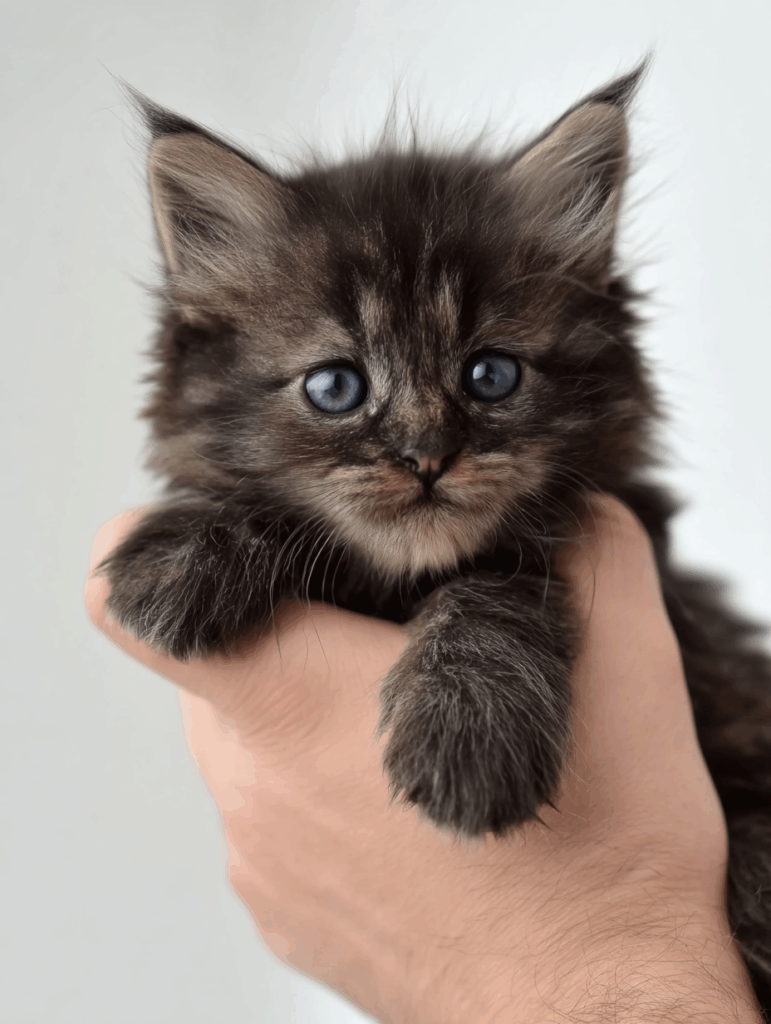
Maine Coon Baby Kitten: The Complete Growth, Color, and Care Guide
Few sights rival that of a Maine Coon baby kitten — tiny, tufted, and full of promise.
These kittens grow into the gentle giants of the cat world, but their journey from birth to maturity is long, fascinating, and unlike any other breed.
This guide covers every stage — from newborn fuzzball to young adult — with details on size, milestones, and coat colors. You’ll also learn what baby Maine Coons look like, how their colors change, and how to find a healthy, ethically bred kitten.
What Is a Baby Maine Coon?
A baby Maine Coon is instantly recognizable: a rectangular body, long fluffy tail, and those signature lynx-tipped ears. Even at a few days old, they look different from most kittens.
Their bones are heavier, their paws oversized, and their expressions already wise beyond their weeks.
Quick Facts:
- Maine Coon Kitten Birth Weight: 90–120 grams
- Eyes open: 7–10 days
- Fur: Soft down; full texture develops by 12 weeks
- Temperament: Gentle, social, alert, confident
At this early stage, all focus is on health, warmth, and nutrition. Ethical breeders weigh kittens daily and monitor milk intake carefully to ensure healthy growth. See Maine Coon kittens growing week by week here.

One-Month-Old Maine Coon Kitten: The Transitional Stage
At four weeks, baby Maine Coons begin exploring. They learn to stand, wobble, and meow at their humans. Their personalities begin to emerge — some bold, some shy — but all playful and curious.
Milestones at 1 Month:
- Weight: 500–800 g
- Eyes: Fully open, often bright blue
- Teeth: Tiny milk teeth start erupting
- Behavior: Walking, climbing, wrestling littermates
- Food: Begin sampling softened kitten mush
Socialization begins here. Breeders gently introduce toys, sounds, and safe human touch, laying the foundation for the confident, affectionate Maine Coon temperament. Learn about Maine Coon kittens development from birth to one year in this article.
Maine Coon Baby Kitten (6–8 Weeks)
A Maine Coon baby kitten at 6–8 weeks becomes much more adventurous. They start learning litter box skills, climb everything they can reach, and demand attention constantly.
At this stage:
- Coat lengthening around the chest and tail
- Eyes may begin changing from blue to green/gold
- Coordination improves — they jump, pounce, and play
- Early training (grooming and nail trims) begins
By eight weeks, they’re still growing rapidly but developing strong muscle tone and coordination. They start to resemble mini adults — with a kitten’s playfulness but a giant’s poise.
👉 Read: How to Train and Socialize Maine Coon Kittens
Young Maine Coon (8–16 Weeks)
Between 8 and 16 weeks, Maine Coon kittens hit their “toddler” phase. Their energy is boundless, and their curiosity unmatched.
Growth at this age:
- Weight: 1.5–3 pounds
- Fully weaned onto solid food
- Grooming and litter box habits set
- Strong bonding with humans begins
Breeders finalize vet care — vaccinations, microchipping, and health certificates — before kittens go home. By 12–14 weeks, they are ready for placement, mentally and physically.
👉 See Our Available Maine Coon Kittens
Maine Coon Growth Stages (0–5 Years)
Baby Maine Coon Kittens grow slowly — but they do grow! They reach full adult size between 3–5 years, one of the slowest maturing breeds in the cat world.
| Age | Stage | Weight (Approx.) | Key Changes |
|---|---|---|---|
| 0–2 weeks | Neonatal | 90–250 g | Eyes closed, nursing |
| 3–7 weeks | Transitional | 250–700 g | Walking, exploring |
| 8–16 weeks | Kitten | 1–3 lbs | Playful, social, learning |
| 4–12 months | Juvenile | 4–12 lbs | Long legs, “teen” phase |
| 1–2 years | Young Adult | 10–16 lbs | Mane develops, strong frame |
| 3–5 years | Full Adult | 12–20+ lbs | Fully mature coat & structure |
Their coat and mane reach full length around two years, and most males don’t reach full weight until age four.
👉 Explore the Full Maine Coon Growth Chart
Baby Maine Coon Cats: Temperament and Early Care
Even as babies, Maine Coons show the intelligence and easygoing nature that make them so beloved. They chirp and trill more than they meow, love interactive play, and adapt easily to new environments.
Early Care Essentials:
- Frequent meals (3–4 times per day)
- Gentle daily grooming to prevent tangles
- Early exposure to noises, toys, and new people
- Enrichment toys to engage their hunting instincts
These early habits create confident cats that fit seamlessly into family life.
👉 Read: How to Raise a Confident Maine Coon Kitten
What Do Baby Maine Coon Kittens Look Like?
If you’re picturing a baby Maine Coon, think “lion cub meets teddy bear.” Their rectangular body and strong muzzle set them apart from rounder domestic kittens.
Signature Traits:
- Triangular face with a square muzzle
- Tufted ears and paws
- Long, plume-like tail
- Large eyes that stay expressive into adulthood
Their coat grows thicker and fuller as they age, especially around the neck (ruff), chest, and tail.
👉 Explore Our Maine Coon Kittens Color Gallery
See the difference between American and European Maine Coons here.
Maine Coon Kitten Colors and Patterns
Maine Coons come in over 75 color combinations, from solid shades to dramatic smokes and silvers. Below are the most popular and most-searched baby Maine Coon colors you can feature or link to individual posts.
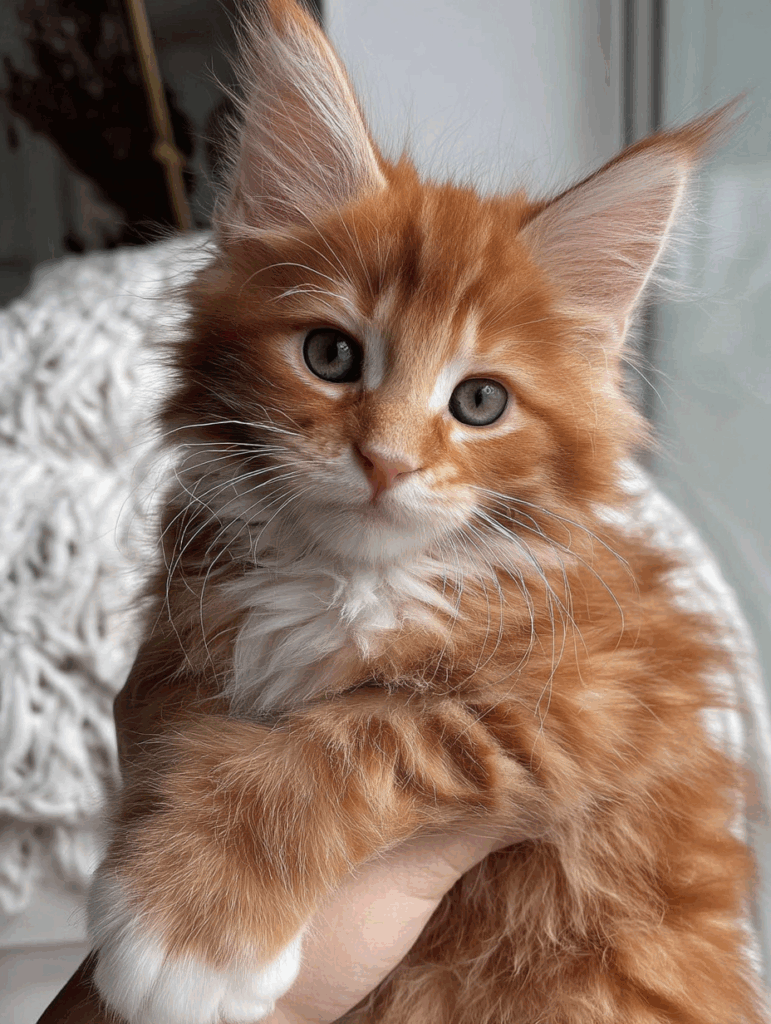
🧡 Orange Maine Coon Kitten (Red)
An orange baby Maine Coon kitten — technically “red” in genetics — glows like autumn sunlight. Their coats range from deep rust to soft cream, usually with a tabby overlay.
Traits:
- Eye Color: Gold to copper
- Common Patterns: Classic tabby, mackerel tabby, cream tabby
- Temperament: Outgoing, playful, social
Orange Maine Coons are known for being confident and affectionate — perfect for families or first-time owners. See photos of orange maine coon kittens here.
👉 Read More: Orange Maine Coon Color Guide
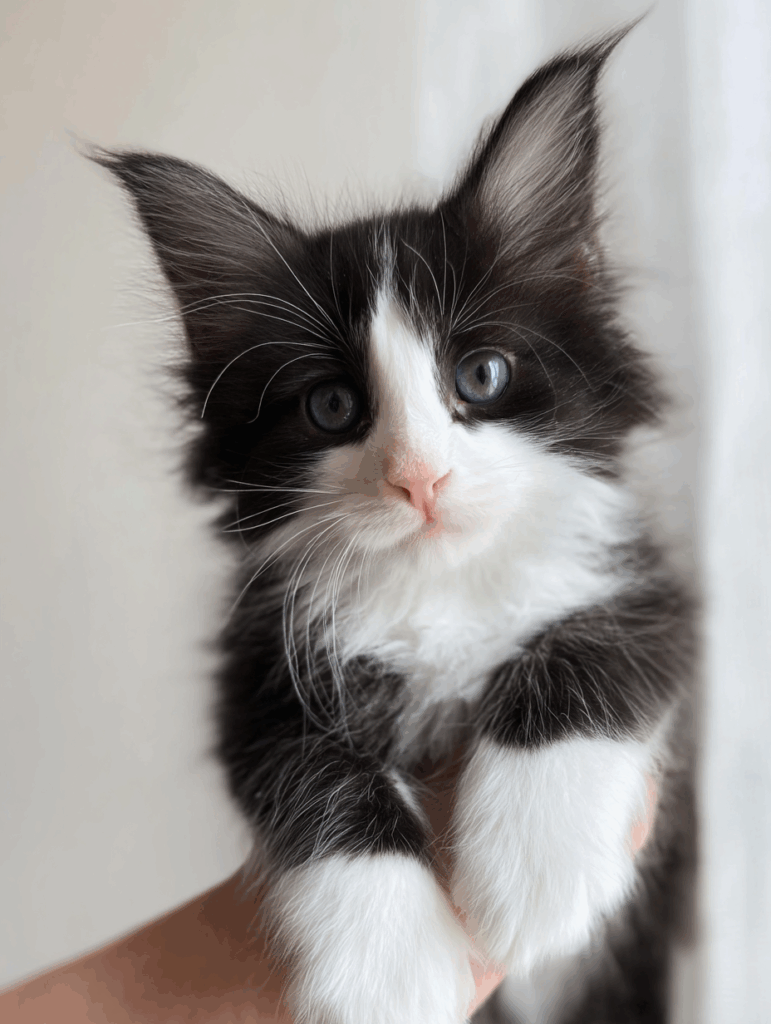
🖤 Black Baby Maine Coon Kitten
A black baby Maine Coon kitten has a striking, glossy coat that can appear smoky in bright light. True solid blacks have no visible patterning, but many kittens show ghost tabby markings that fade with age.
Traits:
- Eye Color: Gold or green
- Variations: Black smoke, black tabby, black tortie (females)
- Fun Fact: Sunlight can give their fur a bronze sheen
They are among the rarest solid colors — elegant, mysterious, and highly sought after.
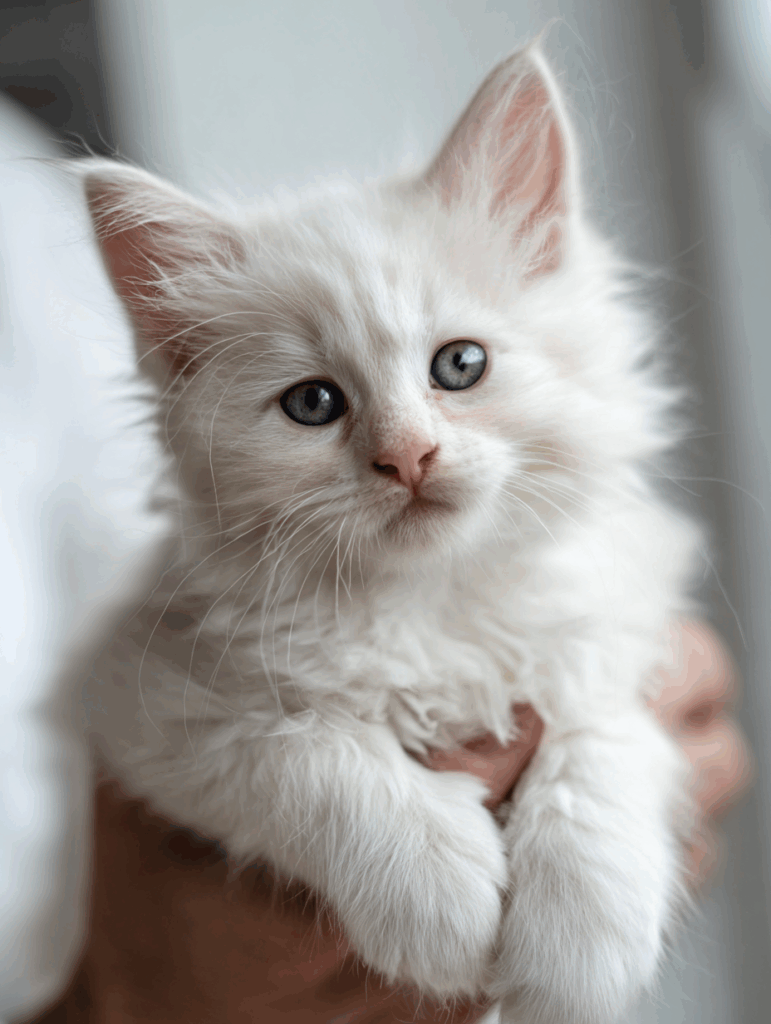
🤍 White Baby Maine Coon Kitten
White Maine Coons are ethereal — pure white coats, pink noses, and sometimes odd eyes (one blue, one gold). The white gene masks all underlying color, meaning your kitten could genetically be a tabby, red, or black under the white coat.
Traits:
- Eye Color: Blue, gold, or odd-eyed
- Grooming Needs: Moderate; coat shows dirt easily
- Note: Blue-eyed whites can occasionally be deaf — breeders test for BAER hearing
👉 Explore White Maine Coon Photo Gallery
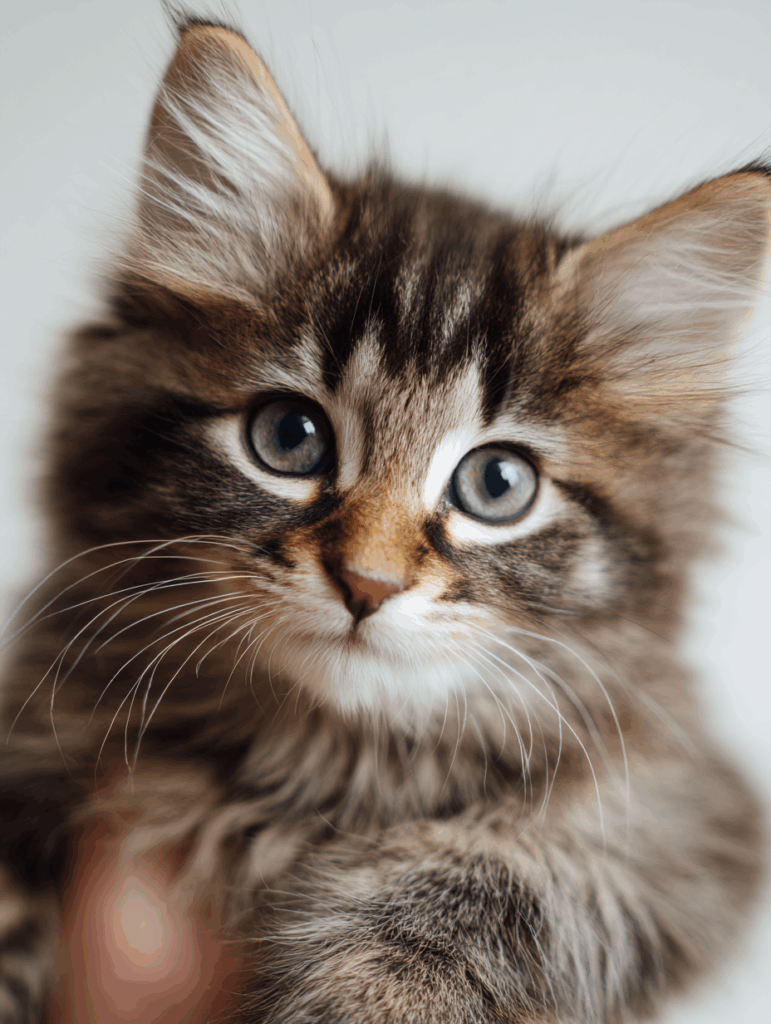
🐅 Brown Tabby baby Maine Coon Kitten
The classic brown tabby Maine Coon remains the hallmark of the breed. Rich golden-brown fur, black stripes, and a shaggy ruff give them that “wild lynx” look.
Traits:
- Eye Color: Gold or green
- Pattern: Mackerel, classic, or spotted tabby
- Temperament: Friendly, confident, vocal
This is the color most often associated with the breed’s early New England working-cat heritage.
💎 Silver, Blue, and Cream baby Maine Coon kittens
These colors appear when dilution or inhibitor genes modify traditional shades.
- Silver Maine Coons: Have a frosted base coat and dark tipping, creating a shimmering effect.
- Blue Maine Coons: Soft slate-gray coat with a cool tone, often with golden eyes.
- Cream Maine Coons: Pale peachy color, soft and pastel-like; often in bicolor or tabby combinations.
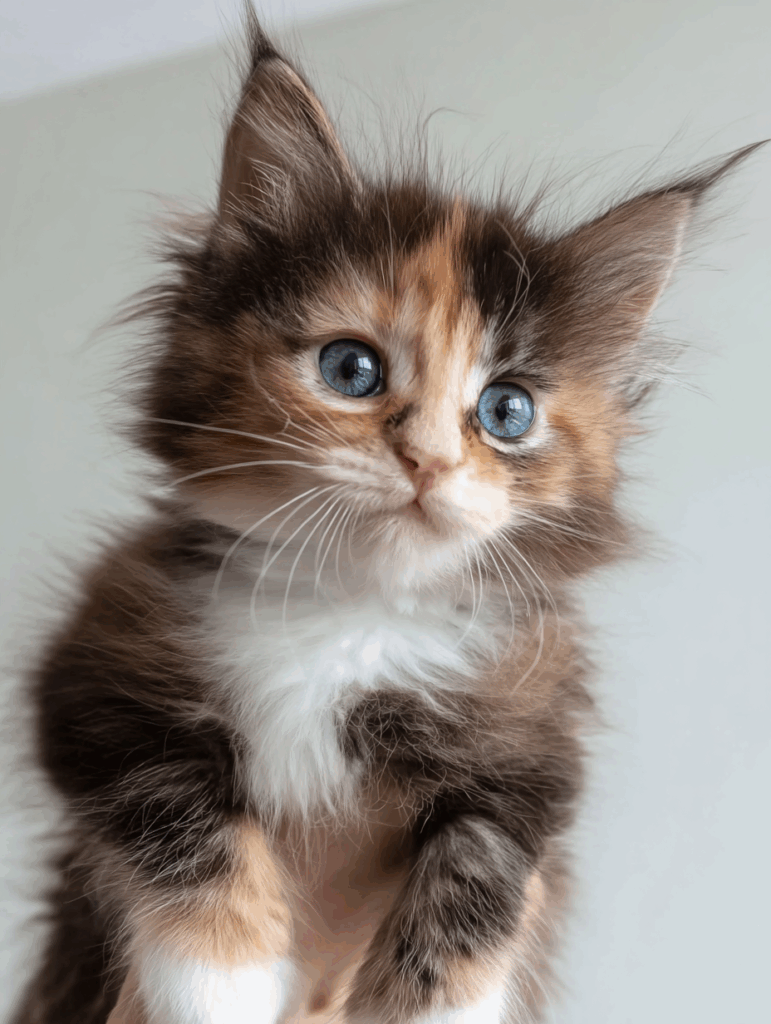
Calico Maine Coon Kitten
A Calico Maine Coon kitten is a showstopper — a living patchwork of fiery red, deep black, and bright white. These tricolor beauties are genetically female in nearly all cases, because the orange and black genes both sit on the X chromosome.
No two calicos are alike. Each pattern is a unique blend of bold patches and soft intermingling colors across their long, luxurious coat. You might see one kitten with a split-face pattern of orange and black, and another with delicate marbling along the tail and ruff.
Traits of Calico Maine Coons:
- Color mix: Black + Red (orange) + White
- Gender: Almost always female (over 99%)
- Patterns: Classic, patched, or dilute (soft pastel version with gray and cream instead of black and red)
- Eye color: Gold, copper, or green
- Personality: Social, intelligent, confident — typical of Maine Coons, regardless of coat
Calico Maine Coons are considered one of the most visually striking and genetically special color combinations in the breed. Dilute calicos (also called “blue-cream-and-white”) have a softer, silvery appearance and are highly sought after in show lines.
Fun Fact:
Male Calico Maine Coons are exceedingly rare — roughly one in 3,000 births — and usually sterile due to an extra chromosome (XXY genetic pattern).
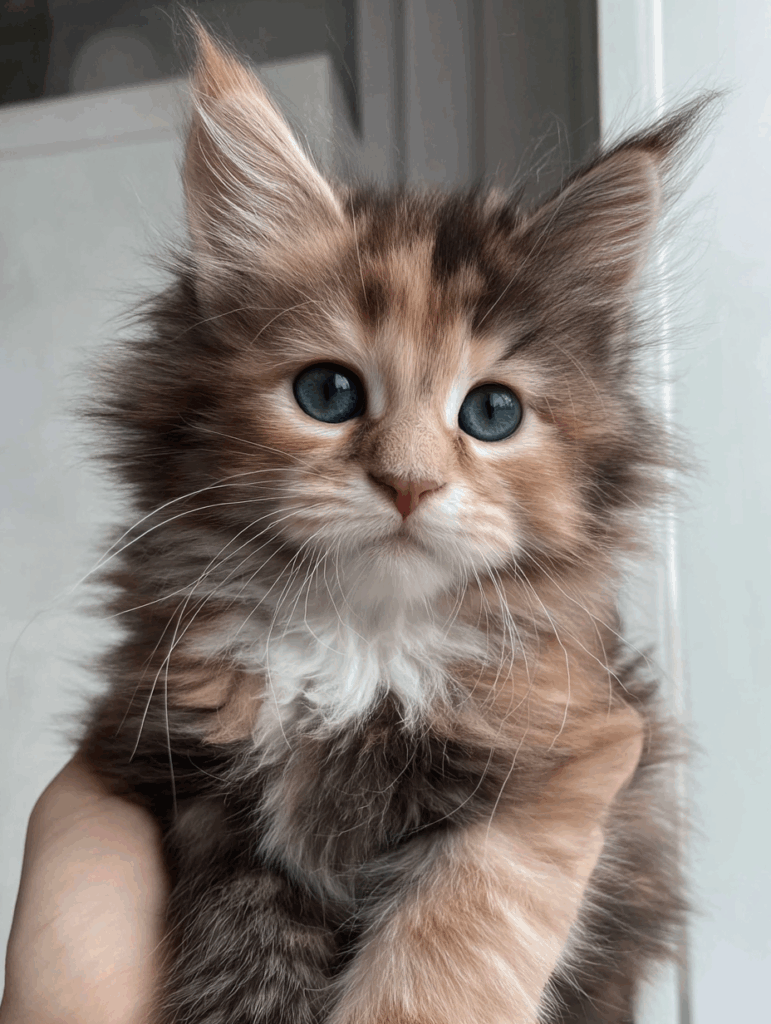
Tortie & Dilute Tortie Maine Coon Kittens
A tortoiseshell Maine Coon kitten, often called a tortie, carries a stunning mix of black and red (orange) fur swirled together without white. The colors appear marbled rather than patched — like molten copper and onyx blended through their coat.
Torties are sometimes confused with calicos, but the difference lies in white spotting:
- Calico Maine Coons have distinct white patches alongside red and black.
- Tortie Maine Coons have no white, with colors intermingled throughout the coat.
Both are almost always female, since the orange and black genes are carried on the X chromosome.
Traits of Tortie Maine Coon Kittens:
- Color mix: Red/orange + black (no white)
- Pattern: Marbled or brindled, not patchy
- Gender: 99% female
- Eye color: Gold to green
- Temperament: Confident, expressive, and playful — many owners call them “big personalities in beautiful coats.”
🌸 Dilute Tortie Maine Coon Kittens
A dilute tortie Maine Coon is the softer, pastel version of the traditional tortie.
Instead of black and red, the dilution gene (d) changes pigments to blue (gray) and cream. The result is a silvery, smoky blend that looks powdery and elegant — especially striking on the long Maine Coon coat.
Traits of Dilute Tortie Maine Coons:
- Color mix: Blue (diluted black) + Cream (diluted red)
- Pattern: Softly marbled; sometimes faint patches
- Gender: Almost always female
- Personality: Affectionate, people-oriented, slightly calmer than standard torties
- Coat type: Silky, medium-long, and lighter in density than darker counterparts
Some dilute torties also carry the white spotting gene — when they do, they’re technically dilute calicos, displaying blue, cream, and white patches.
So while all dilute calicos are genetically torties with white, not all dilute torties have white. That’s the key difference.
Quick summary:
- Tortie: Black + Red, no white
- Calico: Black + Red + White
- Dilute Tortie: Blue + Cream, no white
- Dilute Calico: Blue + Cream + White
These pastel-toned kittens are among the most eye-catching Maine Coons available, prized by breeders and families alike for their rare coloring and sweet, expressive faces. See more Calico and Tortie Maine Coon Kittens here.
Color Development and Genetics
Maine Coon kittens are born lighter. Their adult color gradually appears over 3–6 months as pigment deepens and pattern definition sharpens.
Color Influences:
- Agouti gene (A): Creates tabby patterns
- Dilution gene (d): Softens colors like black → blue, red → cream
- Silver gene (I): Adds metallic shimmer or smoke effect
- White masking gene (W): Covers all color, creating solid white kittens
Understanding your kitten’s genetics helps you predict their adult look — and appreciate how dynamic Maine Coon coats truly are.
Where to Buy baby Maine Coon Kittens
Finding a reputable breeder matters more than any color or price tag.
When searching where to buy Maine Coon kittens, prioritize health, ethics, and transparency.
Checklist Before Buying:
- Registered with TICA or CFA
- DNA testing for HCM, SMA, and PKD
- Written health guarantee
- Veterinary health record and microchip
- Early socialization and temperament testing
Avoid sellers who offer “purebred” kittens without registration or health paperwork. These kittens are often untested and can carry hereditary issues.
At Almonte Cats, every Maine Coon kitten is:
- Raised in-home with 24/7 socialization
- TICA/CFA registered
- Vet-checked, vaccinated, and microchipped
- Fed premium diets and litter-trained before going home
👉 Apply to Reserve a Maine Coon Kitten
From Baby to Gentle Giant: What to Expect
Raising a Maine Coon is an experience like no other. They grow slowly but bond deeply — loyal, intelligent, and endlessly entertaining.
Whether you fall for a fiery orange, regal black, or snow-white Maine Coon kitten, you’re bringing home more than a pet — you’re welcoming a lifelong friend.
In summary:
- Baby Maine Coons are larger, smarter, and more social than most kittens
- They reach full size between 3–5 years
- Their coat color and pattern evolve for months after birth
- Early socialization creates confident adult cats
👉 See Available Maine Coon Kittens at Almonte Cats
Frequently Asked Questions About Maine Coon Baby Kittens
Do Maine Coon kittens change color as they grow?
Yes. Most Maine Coon kittens are born lighter, and their true color develops gradually over the first 6–12 months. For example, orange kittens may deepen to red, and black kittens may darken or show subtle smoke patterns. Coat length and mane fullness also increase during the first two years.
At what age do Maine Coons get their mane?
The mane — that signature ruff around the neck — begins forming around 8–12 months but doesn’t fully mature until the cat is 2–3 years old. Seasonal shedding may make the mane appear fuller in winter and thinner in summer.
How big are Maine Coons at 6 months old?
At 6 months, most Maine Coons weigh between 6–10 pounds, depending on genetics, gender, and diet. They look lanky and teenage-like at this stage but will continue filling out until around 4 years old. See Maine Coon growth stages here.
What color are Maine Coon kittens’ eyes?
All Maine Coon kittens are born with blue eyes. Their permanent eye color — gold, green, copper, or blue (in whites) — appears between 8–12 weeks. Some may keep blue eyes if they carry the white or colorpoint gene.
When can Maine Coon kittens leave their breeder?
Ethical breeders keep Maine Coon kittens until 12–14 weeks of age. This ensures they are fully weaned, vaccinated, litter trained, and emotionally ready for their new homes.
See Best Toys for Maine Coon Kittens here.
Are orange Maine Coons always male?
About 80–90% of orange (red) Maine Coons are male due to the genetics of the orange gene, which is sex-linked. Female orange kittens require both parents to carry the orange gene, making them much rarer.
Do black Maine Coon kittens stay black?
Usually, yes — but some kittens lighten slightly as their undercoat develops. Others reveal a “smoke” pattern where the roots are pale silver. Sunlight can also give their fur a warm bronze tone over time.
See more about Black Smoke Maine Coon kittens.
Are white Maine Coons deaf?
Not always. Blue-eyed white cats can carry a gene that increases the risk of congenital deafness. Responsible breeders perform BAER hearing tests on white kittens to ensure auditory health before placement.
When do Maine Coons stop growing?
Most Maine Coons reach full size between 3–5 years old. Their height and bone structure mature by age 2, but muscle and coat continue to develop for several more years.
How can I tell if my baby kitten is a Maine Coon mix?
Look for a rectangular body shape, tufted ears and paws, a long tail, and a chirpy voice. However, the only way to confirm is through a DNA test or by verifying pedigree registration with TICA or CFA.
How much should a Maine Coon kitten eat?
Feed young kittens 3–4 small meals per day of high-protein, grain-inclusive kitten food. Portion sizes depend on weight, but aim for 200–250 calories per day during active growth periods.
Do Maine Coons shed a lot?
They shed moderately year-round and heavily during spring and fall. Regular brushing 2–3 times a week keeps the coat clean and prevents matting — especially around the tail and belly.
Are Maine Coon kittens good with dogs and kids?
Yes. Maine Coons are known for their calm, confident personalities. Early socialization helps them adapt to households with gentle children and well-behaved dogs.
How long do Maine Coons live?
With proper care, most Maine Coons live 12–15 years. Indoor cats with balanced diets and routine vet care often exceed this average.
Do Maine Coons like water?
Many do! Their semi-water-resistant coats and playful nature make them one of the few cat breeds that may enjoy splashing or dipping their paws in water bowls.
What is the rarest Maine Coon color?
Some of the rarest colors include chocolate, lilac, and shaded silver. These colors appear less frequently in traditional breeding lines and are often seen in imported or outcrossed pedigrees. See European Maine Coon details in this post.
How much do Maine Coon kittens cost?
In the U.S., prices for purebred, health-tested Maine Coons typically range from $3,000–$6,000, depending on color, gender, pedigree, and breeder reputation. Rare colors or show-quality kittens may cost more.
👉 Read How Much is a Maine Coon for more price details.
Can I adopt a baby Maine Coon kitten near me?
Yes, but it’s important to verify registration and breeder ethics. Look for TICA or CFA registered breeders in your region or contact trusted catteries like Almonte Cats for nationwide placement and delivery.
Do Maine Coon kittens stay playful as adults?
Absolutely. Maine Coons retain their kitten-like curiosity throughout life. Even as 20-pound adults, they love interactive toys, laser pointers, and feather wands.
What’s the difference between a Maine Coon kitten and other longhair breeds?
Maine Coons have a rectangular frame, boxy muzzle, tufted ears, and a longer, flowing tail compared to Persians or Ragdolls. Their coats are water-resistant rather than woolly, and they’re typically more athletic and dog-like.
Can Maine Coons be indoor-only cats?
Yes. Many breeders and veterinarians recommend keeping Maine Coons indoors or providing secure outdoor enclosures. Their friendly nature makes them vulnerable if allowed to roam freely.
When should I start grooming my baby Maine Coon kitten?
Begin grooming at 8 weeks old. Use a soft brush and short sessions to build tolerance. Regular brushing prevents tangles and matting, especially during coat changes.
Do Maine Coons have health problems?
Common concerns include hypertrophic cardiomyopathy (HCM), spinal muscular atrophy (SMA), and polycystic kidney disease (PKD). Reputable breeders DNA-test all breeding cats to prevent these issues.
How can I find a reputable Maine Coon breeder?
A good breeder will:
- Provide TICA/CFA registration papers
- Offer genetic health test results
- Allow virtual or in-person visits
- Use written contracts and health guarantees
- Be open about lineage and care practices
👉 See details about our breeding program
Are Maine Coon baby kittens hypoallergenic?
No. Maine Coons produce the Fel d 1 protein, which causes cat allergies. However, many allergy sufferers find them more tolerable due to their coat texture and grooming habits.
Read about hypoallergenic Maine Coon facts here: Are Maine Coons Hypoallergenic?
Do baby Maine Coon Kittens purr a lot?
Yes. They are known for constant trilling and purring from an early age — often while eating, playing, or being held. Their vocal range is wide and expressive rather than loud.
🔗 Related Articles
- Maine Coon Price by Age
- Maine Coon Mix Cats
- Do Maine Coons Shed? Grooming & Coat Care
- Maine Coon Colors & Genetics Explained
- How to Find A Maine Coon Breeder You Can Trust
- Maine Coon Kitten Cost: USA Price Guide
Sources & Further Reading
- The International Cat Association (TICA) – Maine Coon Breed Standard
Official breed description, conformation standards, and accepted color categories. - Cat Fanciers’ Association (CFA) – Maine Coon Breed
Detailed overview of Maine Coon history, temperament, and show requirements. - Winn Feline Foundation / EveryCat Health Foundation – Genetic Health Research
Research on HCM, SMA, and PKD testing — the core genetic conditions Maine Coon breeders screen for. - Cornell University College of Veterinary Medicine – Feline Growth & Nutrition
Veterinary guidance on kitten growth, development, and diet. - PawPeds Maine Coon Database – Pedigree and Health Registry
Comprehensive, open-access database of pedigrees and health test results for responsible breeders. - American Veterinary Medical Association (AVMA) – Kitten Health & Early Care Guidelines
Trusted veterinary resources on vaccination schedules, socialization, and preventive care.
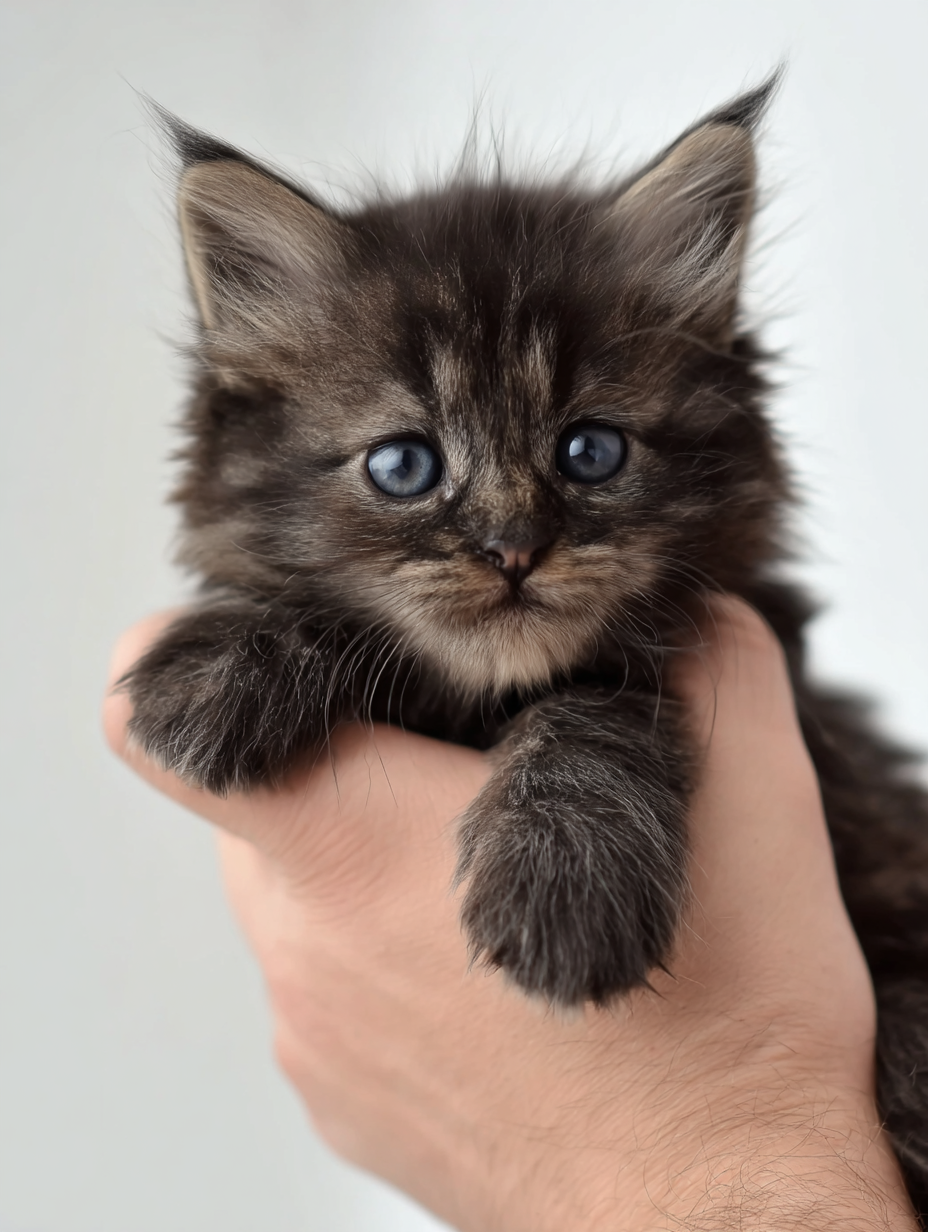
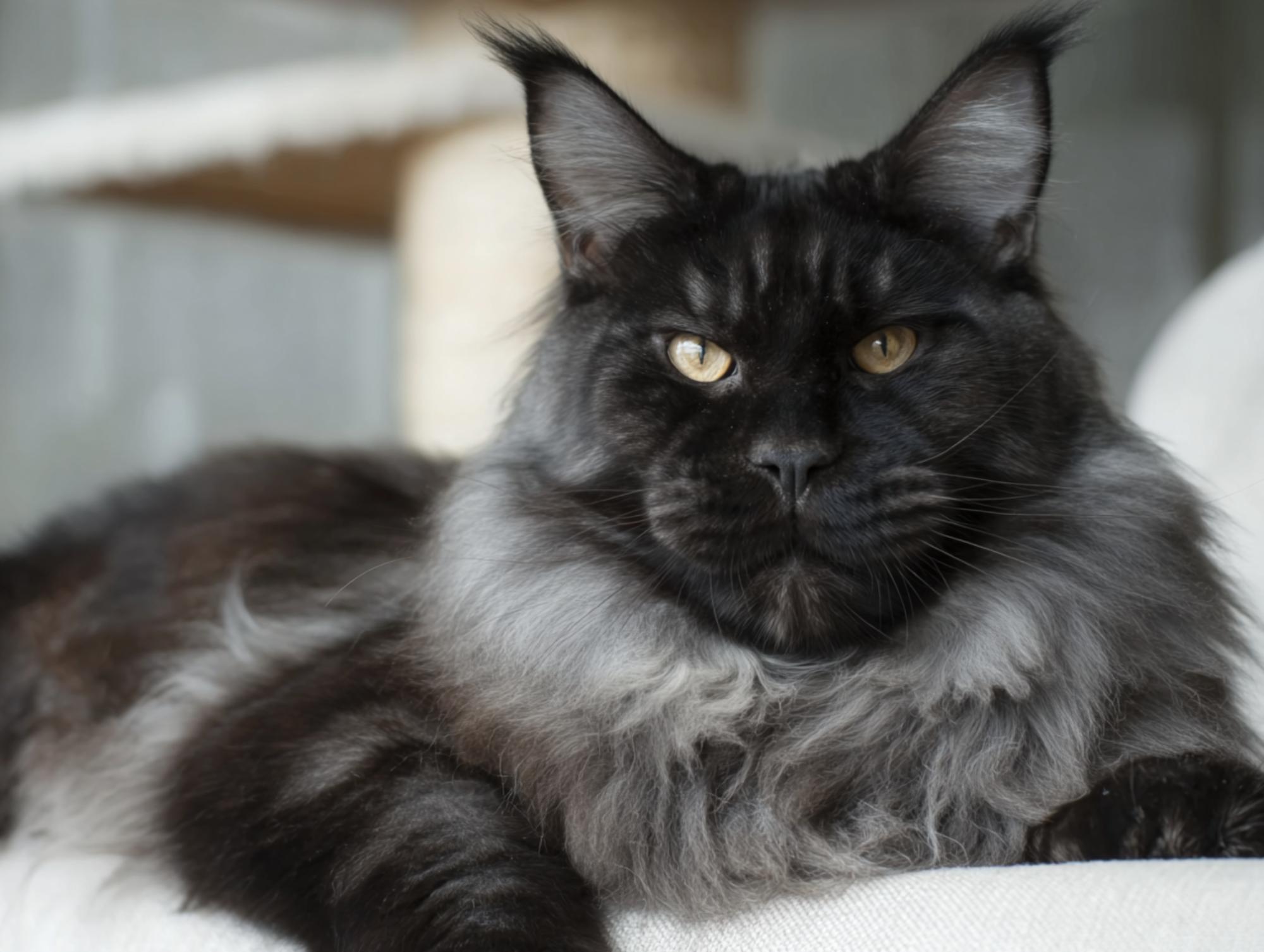
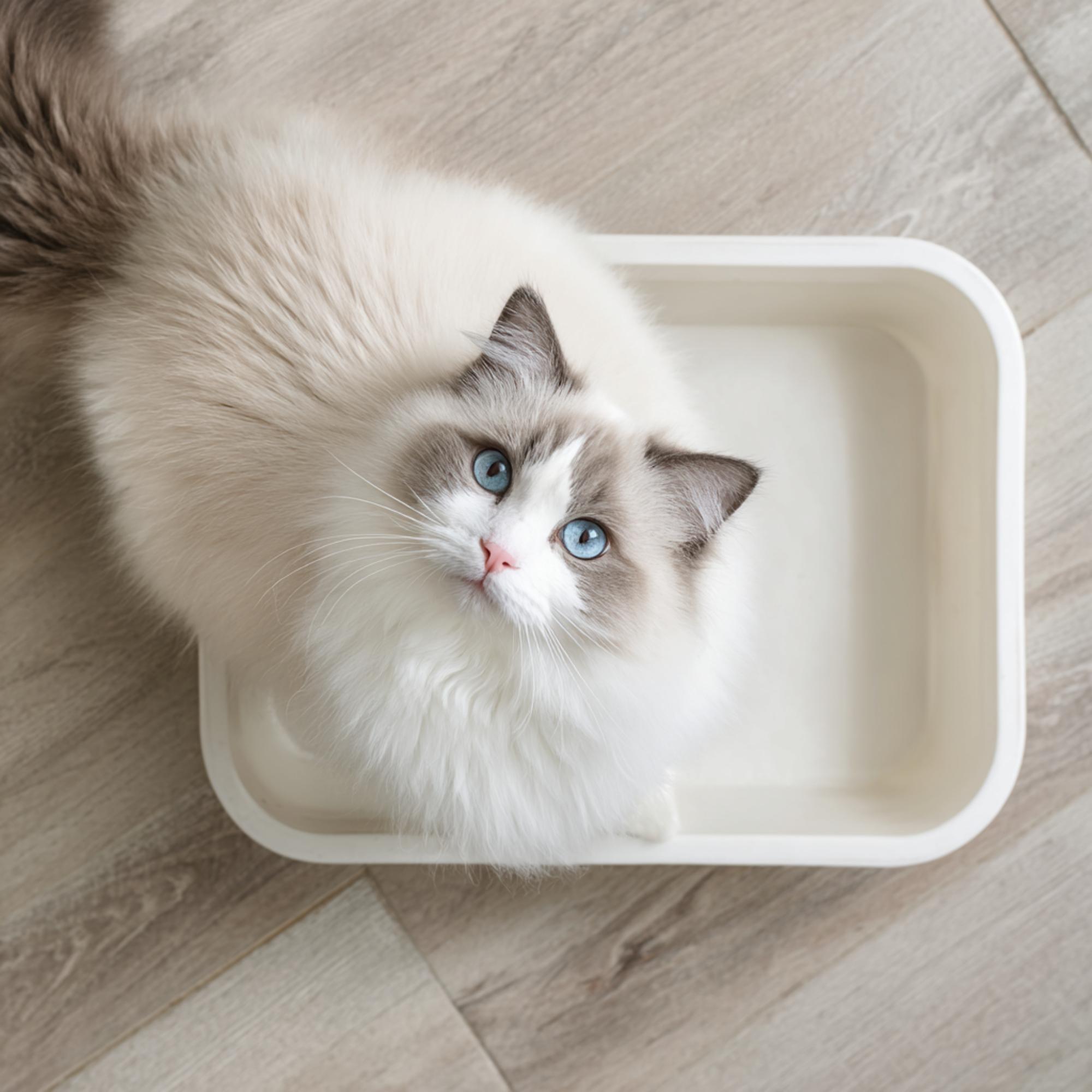
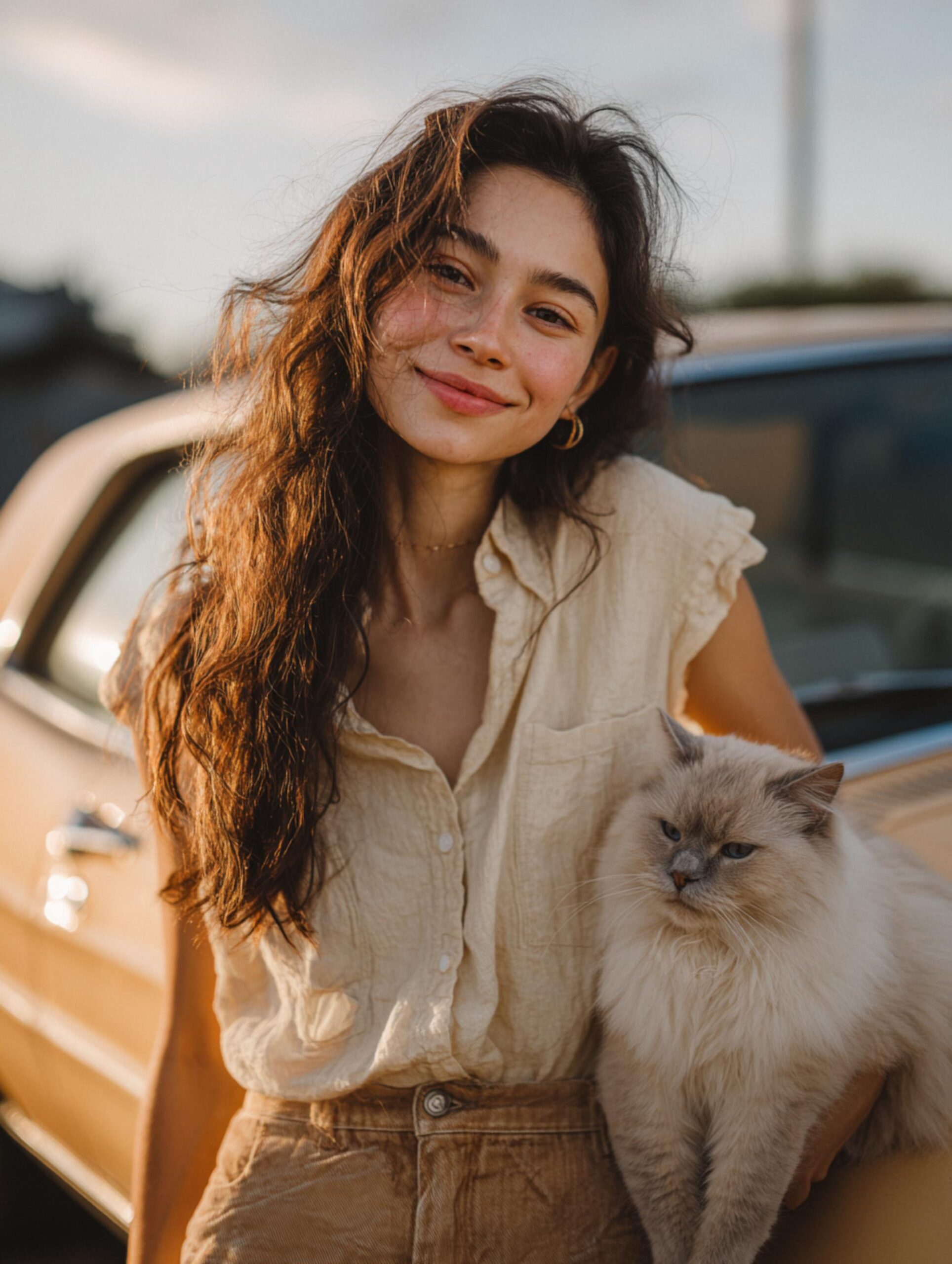
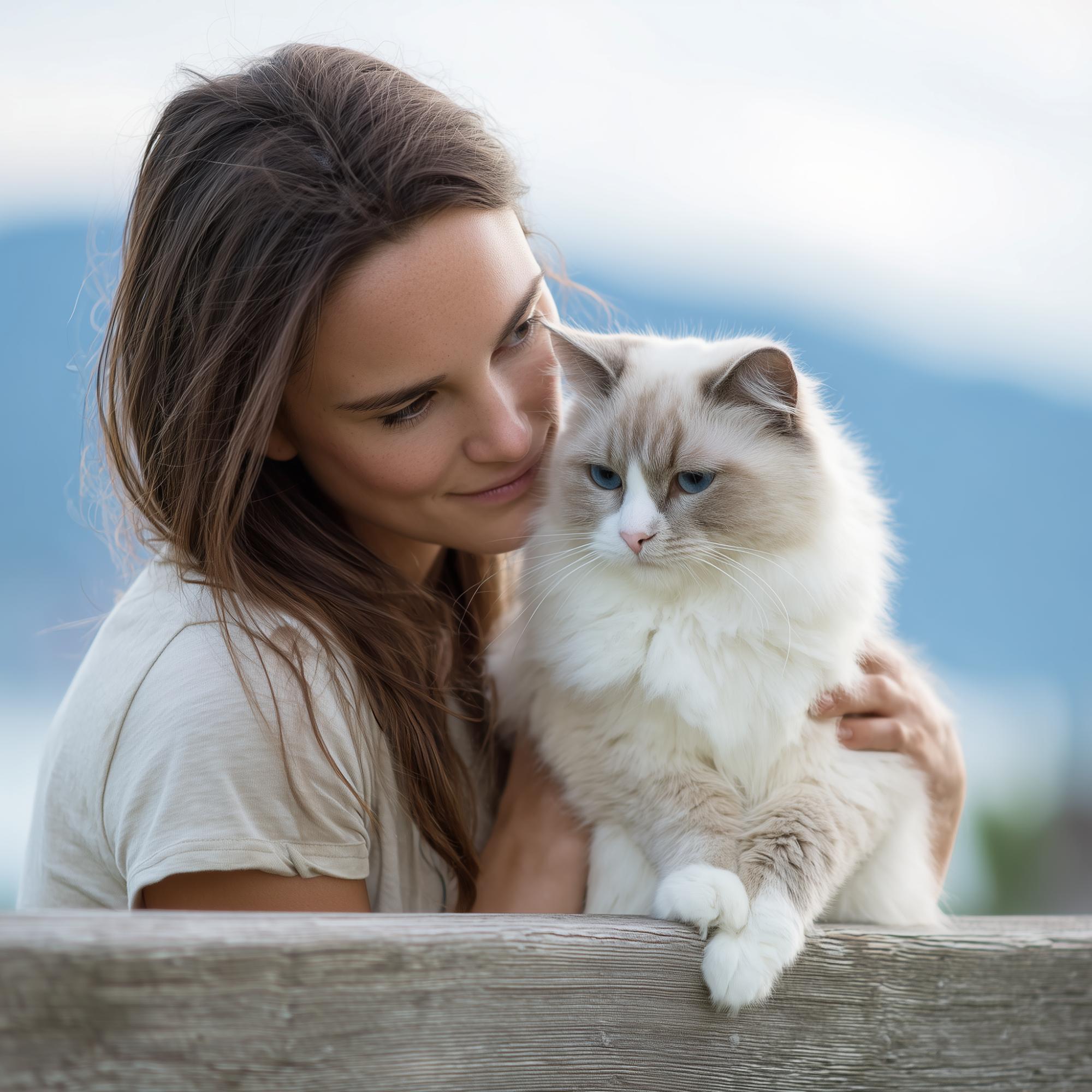
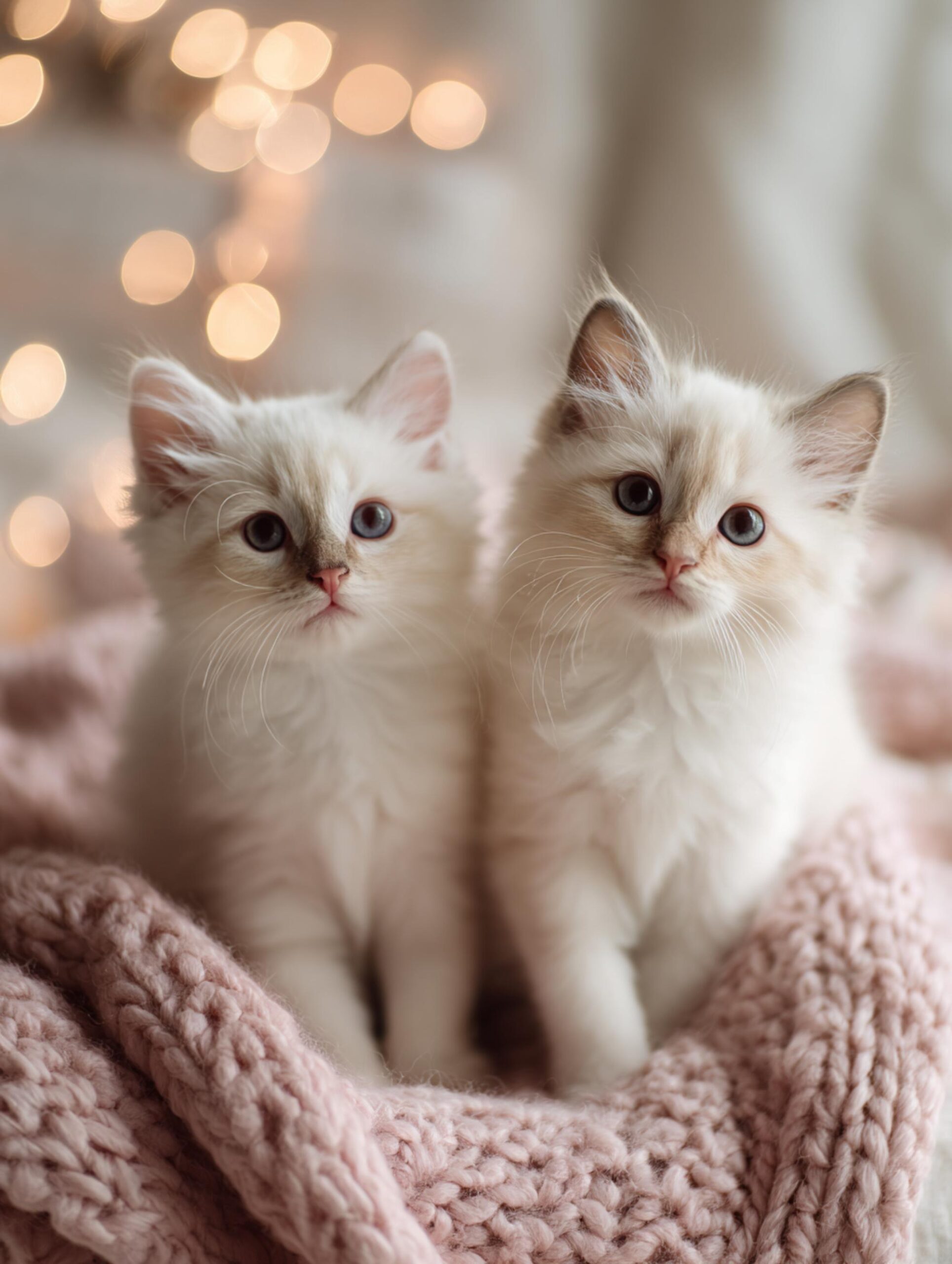
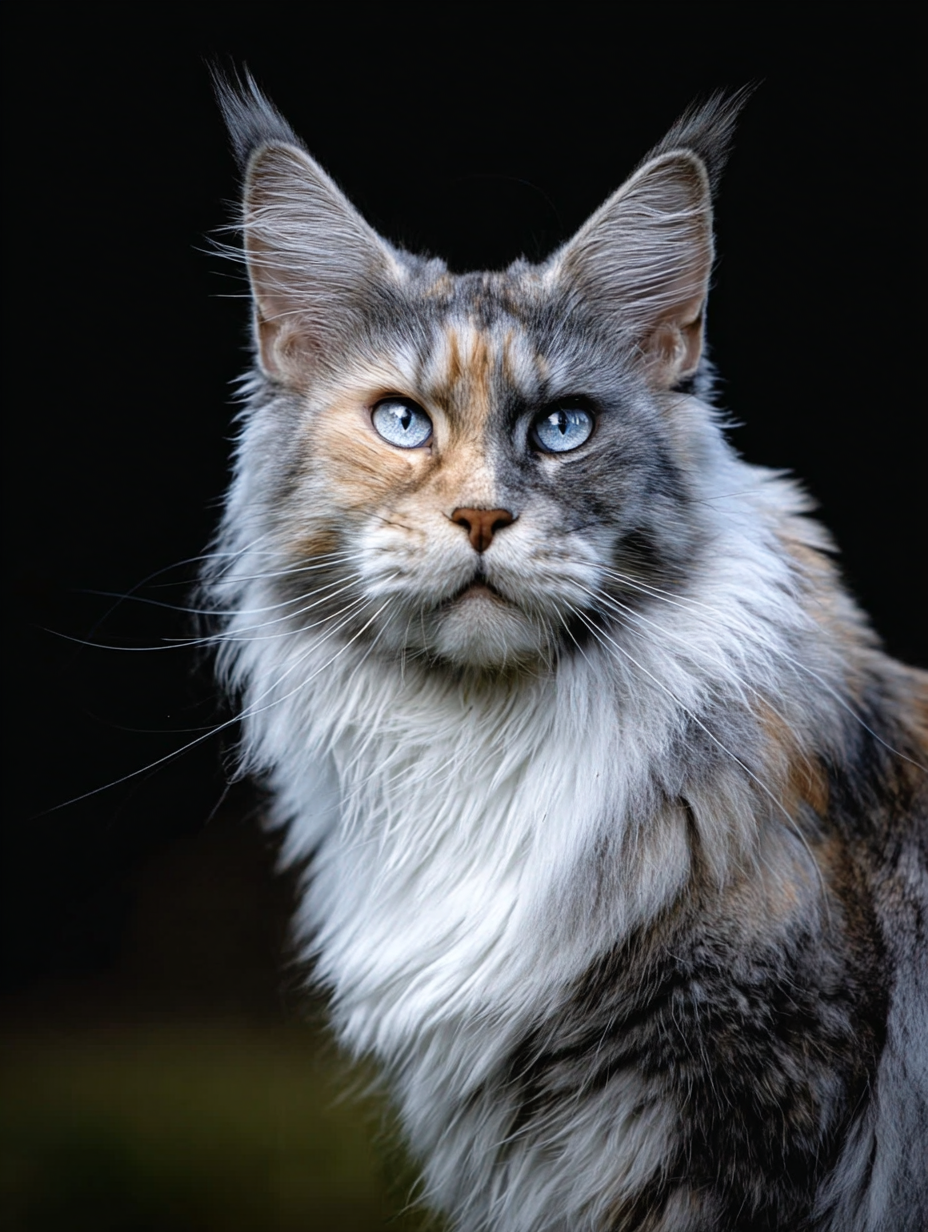
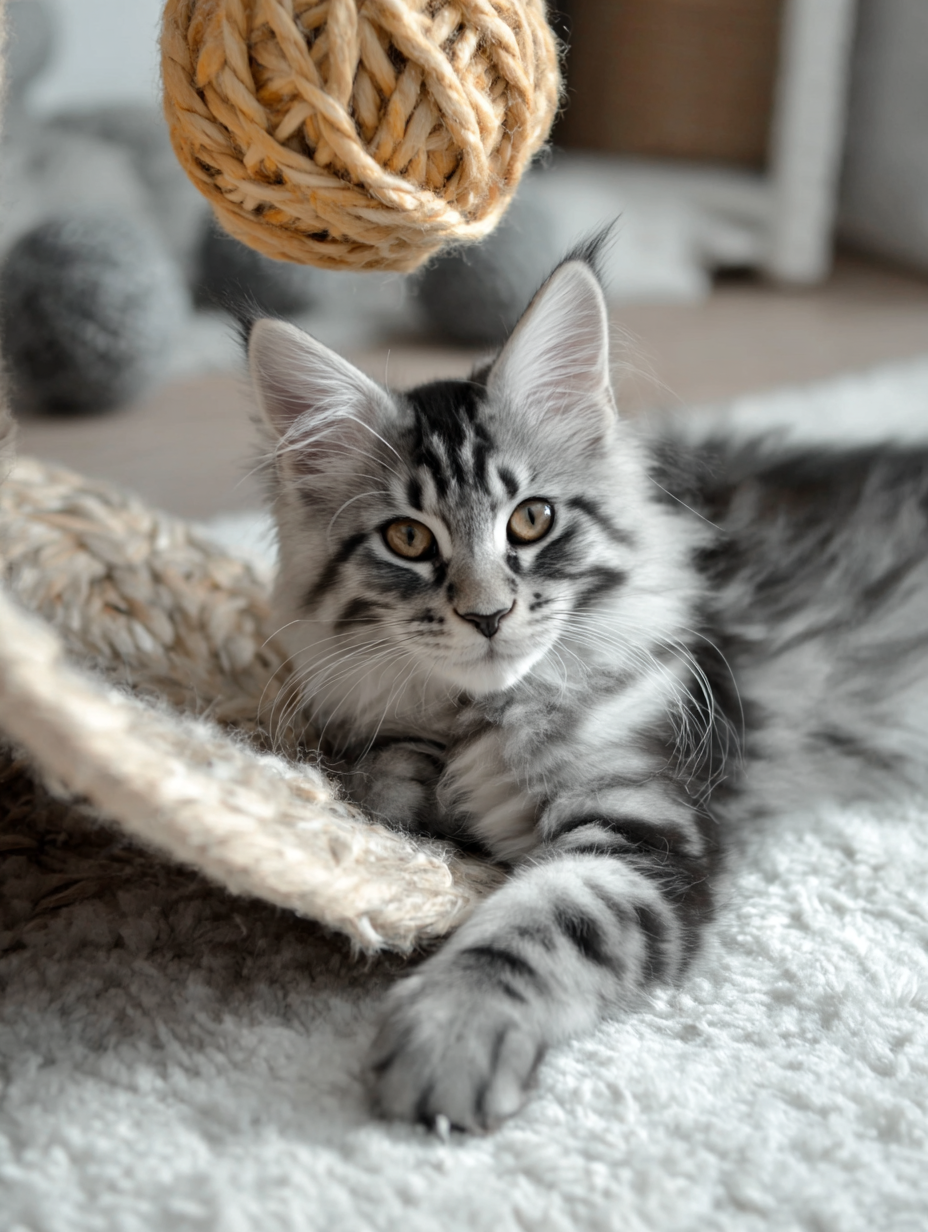
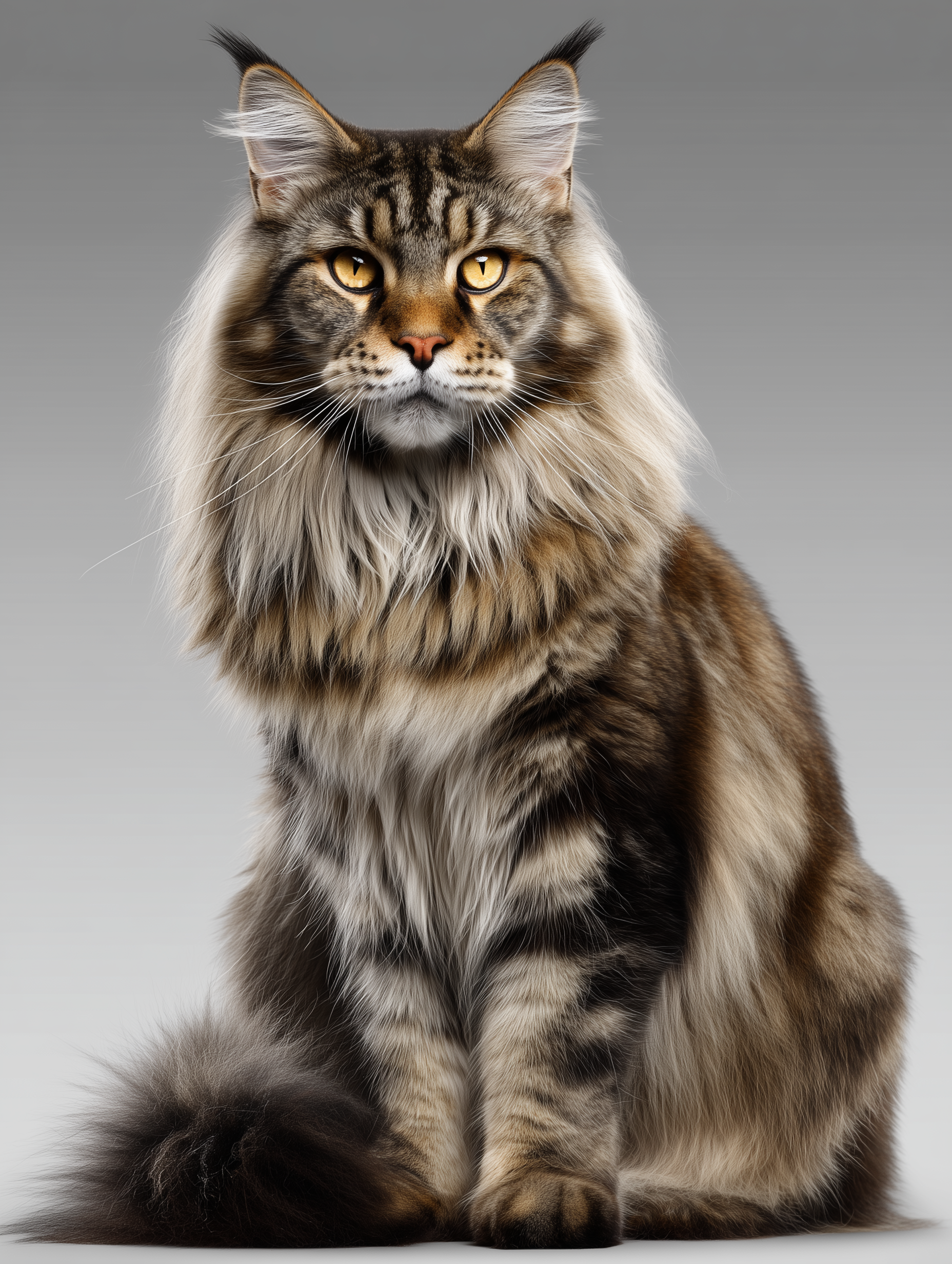
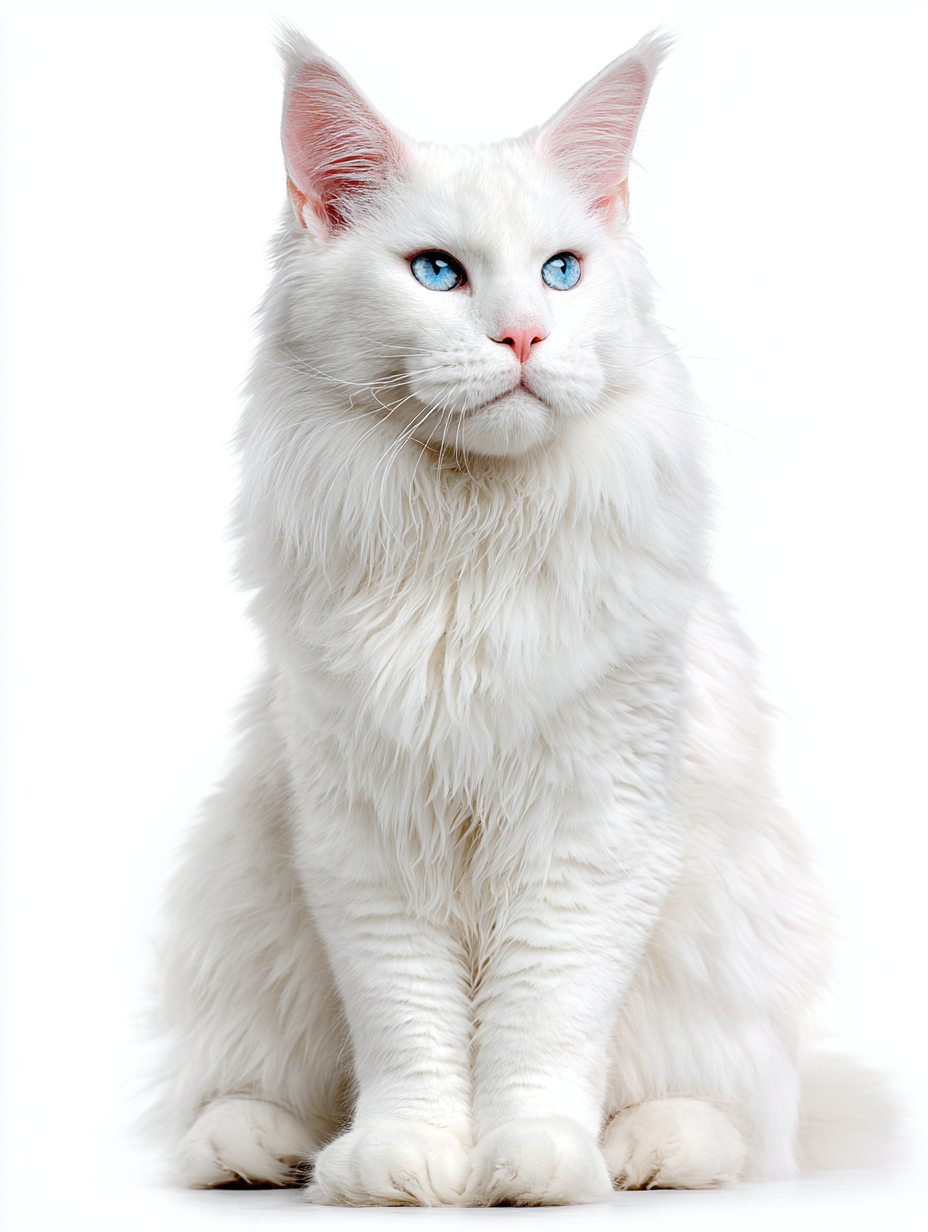
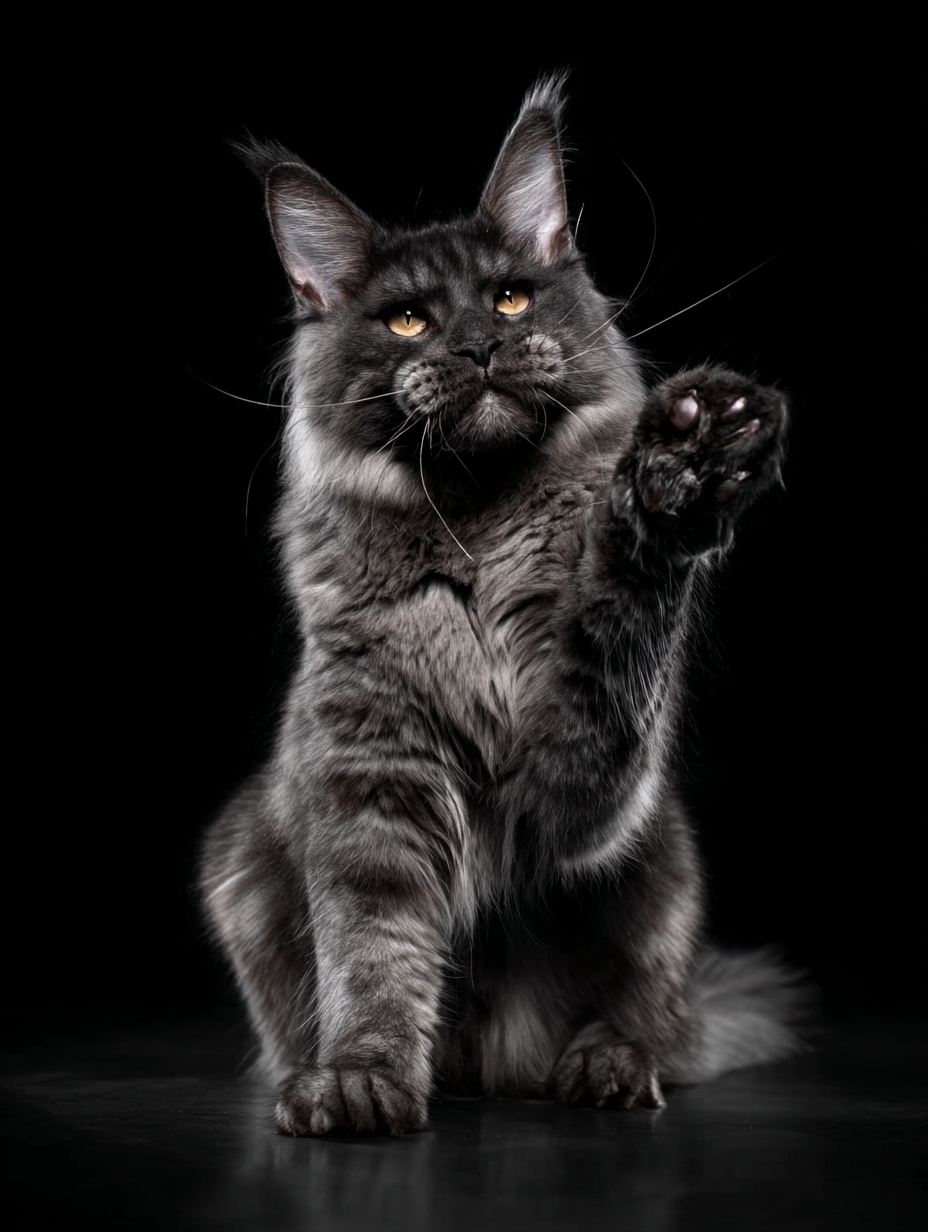
Read the Comments +